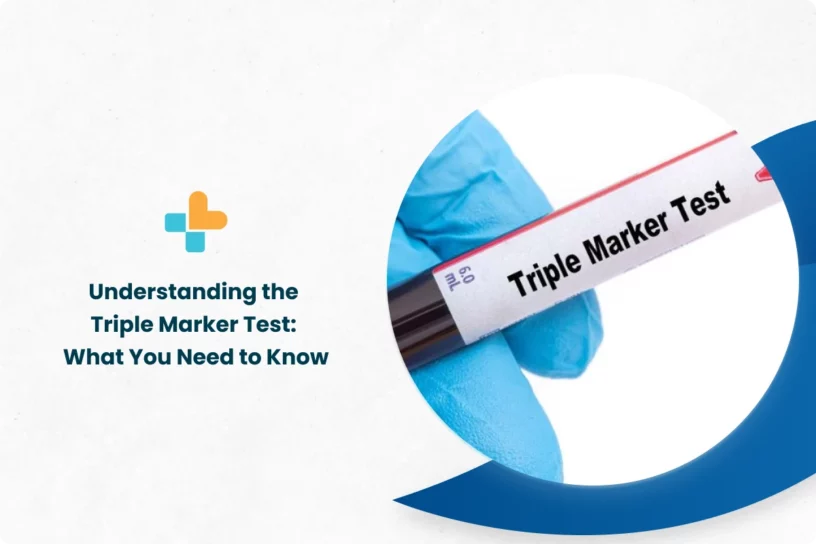Introduction
Pregnancy is a beautiful period in a woman’s life. The utmost care of the mother and child is to be taken during this time. Routine scans and checkups are advised to ensure that the mother and the baby are healthy. One of the tests that are conducted during pregnancy is the triple marker test. It is a test that helps in learning more about the baby.
In this blog, we will be learning more about the triple marker test. So, please keep reading.
What Is A Triple Marker Test?
A triple marker test is performed during pregnancy to check if the baby is likely to have any genetic disorders. This test is otherwise also known as the multiple marker test, AFP test, triple test, and multiple marker screening test. A triple marker test is performed to measure the levels of alpha-fetoprotein (AFP), human chorionic gonadotropin (HCG), and estriol in the placenta.
When Is A Triple Marker Test Required?
A triple marker test is usually conducted between the 15th week and 20th week during pregnancy. This test is necessary, especially in pregnant women who,
- Are aged 35 and above
- Have a family history of genetic disorders
- Have diabetes or prenatal viral infections
- Are taking insulin
- Were exposed to radiation
Benefits Of Triple Marker Test
There are several benefits of a triple marker test which include the following,
- It can help in screening the likelihood of the baby having certain genetic disorders.
- It helps in detecting if the mother is carrying more than one baby (multiple foetuses), which aids in preparing the parents for birth.
What Is Tested In The Triple Marker Test?
A triple marker test is a screening test that is used for detecting the levels of alpha-fetoprotein (AFP), estriol, and human chorionic gonadotropin (HCG) in the placenta.
1. alpha-fetoprotein (AFP): It is a type of protein that is secreted by the baby. High levels of AFP are a sign of defects in the foetus, like neural tube defects.
2. Human chorionic gonadotropin (HCG): Where a low level of this hormone that is produced by the placenta may be a sign of potential complications with the pregnancy, like an ectopic pregnancy or the chances of a miscarriage. A high level of HCG is usually a sign of being pregnant with more than one baby or a molar pregnancy.
3. Estriol: It is secreted by both placenta and the foetus. Low levels of estriol are a sign that the baby may be at risk of having Down syndrome. Especially in the case of low levels of estriol with low levels of AFP and high levels of HCG.
How Is A Triple Marker Test Performed & Its Procedure?
A triple marker test is a type of blood test that is done in a hospital, laboratory, or doctor’s clinic. In this test, the nurse or the lab technician will clean the area where the blood is to be taken from and then draw blood by inserting the injection needle into the patient’s vein. Once the blood is drawn, it will be sent to the laboratory for examination.
This test is just like other blood tests, with no side effects. However, there might be a little pain or discomfort at the site of injection, which will resolve in some time.
Risks And Limitations Of The Triple Marker Test
The main risks and limitations of a triple marker test are,
- The test result may show false positive results, indicating an increased risk of genetic disorders when there is no actual problem with the foetus. This can lead to unnecessary stress and further testing for the expectant parents.
- The triple marker test cannot detect all congenital disabilities. Since the triple marker test is a screening test, not a diagnostic test, it cannot confirm a neural tube defect, trisomy 18, or down syndrome.
It’s important to remember that the results of a triple marker test should be considered along with other information, such as the results of an ultrasound and the mother’s medical history, before making any decisions about further testing or treatment.
Interpretation Of Triple Marker Test Results
The triple marker test may have high rates of false-positive results, so it is important to discuss the results with a healthcare provider. An abnormal test result may require repeating the test and ultrasound before considering invasive procedures like amniocentesis. If the results show high levels of AFP, a detailed ultrasound may be ordered to check for neural tube defects and to determine the age and number of foetuses. It is important to discuss all options and any potential risks with a healthcare provider.
How Much Does It Cost For A Triple Marker Test India?
A triple marker test price varies for different hospitals, clinics, or laboratories. In India, the average triple marker test price may fall between INR 500- INR 3000.
Conclusion
Although the most beautiful phase of a parent’s life, pregnancy can still be overwhelming, especially with the various tests that are conducted during pregnancy. The triple marker test is among the various tests that are conducted during pregnancy. It is important to remember that this test is a screening test and not a diagnostic test. The triple marker test analyses the likelihood of if the baby is at risk of genetic disorders or not. This test helps the parents in preparing themselves for any health problem that may occur. Hence, it is important to discuss any concern you may have regarding the pregnancy and the baby with your healthcare provider.
At Ayu Health, If you need additional information or would like to speak with a professional, feel free to contact us right away at +91 636-610-0800 or book an appointment on our website. we provide various tests that are conducted during pregnancy at affordable prices. We ensure that all mothers-to-be get the best services and care. Our team of highly qualified doctors ensures to be there with the patient at every point in their pregnancy, as our patients are our priority.
FAQs
1. Triple marker test is conducted in which week?
A triple marker test is usually conducted between the 15th week and 20th week during pregnancy.
2. What does it mean if the triple marker test comes out positive?
If a triple marker test result comes out positive, then it means that the baby is at a high risk of having congenital disabilities.
3. What does it mean if the triple marker test comes negative?
If a triple marker test result comes out as negative, then it means that the baby is at low risk of having congenital disabilities.
4. Is the triple marker test an invasive test?
No, triple marker test is not an invasive procedure and will cause no harm to the mother or the baby.
5. What are the side effects of the triple marker test?
There are no side effects associated with a triple marker test. a little discomfort or pain at the injection site might occur. However, it will heal quickly.
Our Hospital Locations
General Surgery Hospitals in Chandigarh | General Surgery Hospitals in Bangalore | General Surgery Hospitals in Jaipur | General Surgery Hospitals in NCR | General Surgery Hospitals in Hyderabad
Our Doctors
General Surgery Doctors in Chandigarh | General Surgery Doctors in Bangalore | General Surgery Doctors in Jaipur | General Surgery Doctors in NCR | General Surgery Doctors in Hyderabad
About the Author

Dr. S. Goel
Dr. S. Goel is a renowned Internal Medicine Specialist currently practicing at Ayu Health, Bangalore. He is a Specialist in Internal Medicine, Diabetes HTN, Paediatric Care, and Family Medicine.




